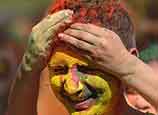
Each show offers insight into aspects of local culture with the aim of promoting it to the outside world. Impression Dahongpao, for example, is named after a precious tea that has been grown for centuries on the Wuyi Mountains in Fujian province, a UNESCO World Heritage site.
"We wish to turn the performance into a real-life museum, which provides a stage for local folk culture to be exhibited and promoted," she says.
More than 2 million people have watched the shows across China to date.
Wang now has her sights set on taking the shows overseas to promote Chinese culture.
"The shows are vivid and true reflections of Chinese culture and Chinese people's life," she says. "If they can be introduced to foreign nations, it will be beneficial for Chinese culture."
Wang believes China's cultural industry is a long way behind that of the West, but has developed rapidly in recent years. One issue it faces is that the Chinese public is not accustomed to spending much money on cultural pursuits, she says.
"Generally speaking, people in developed nations spend about 20 percent of their income in the culture industry," she says. "But in China, people are more likely to spend their money on buying more material things like apartments."
As living standards have improved spending on culture has risen but the industry could do with greater government support, she adds.
The firm aims to develop into a more complete business, according to Wang.
"Some Western cultural companies, such as Disney, make profits not only through their films or dramas, but also by some derivative products," she says.
The company has already begun this process, selling local tea and cultural gifts associated with the Impression Dahongpao show.
"Based on the huge domestic market and potential for China's cultural industry overseas, with our perfect combination of art and business skills I believe the Impression shows will become a world-renowned label like Disney," says Wang.

















 Exhibition marks 10th anniversary of Leslie Cheung's death
Exhibition marks 10th anniversary of Leslie Cheung's death


![]()
